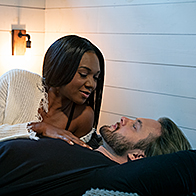How Can I Keep Dysorgasmia From Ruining My Sex Life?

My first experience of dysorgasmia, or severe pain with orgasm, occurred not long after developing vaginismus, which was triggered by a traumatic experience with an ex-partner. While engaging in some me-time to help rejuvenate my relationship with sex, I felt at peace knowing my orgasms would never let me down. Until they did.
There is nothing like the beautiful build-up to an orgasm: feeling the pressure build slowly, allowing the intoxication to wash over you and then tripping off the edge into a lush waterfall of pleasure. Except, this time, that didn't happen. Instead of waves of pulsating pleasure, I felt an agonizing crescendo of pain. The shock was so intense, I couldn't comprehend what was happening. Thanks to a lack of public knowledge and an unsympathetic doctor who dismissed my worries, I internalized the experience and tried to ignore it.
If you experience abdominal pain during or after an orgasm, you aren't alone. And it's not only for women. There is dysorgasmia in men.
What is dysorgasmia?
Dysorgasmia is defined as having abdominal or pelvic pain during or after orgasm. Typically, pain during or after sex occurs in the abdomen at the moment of or immediately after orgasm, but sometimes may be delayed several hours after climax. People of all genders may experience it.
This is a different sexual health condition than dyspareunia, or pain in or around the genitals during or sexual intercourse, whether or not there was an orgasm involved.
"Pain in the abdomen or pelvic area during or immediately after you reach orgasm is officially known as dysorgasmia, usually without any prior pain during sexual intercourse," said OB-GYN and author of "Living PCOS Free" Nitu Bajekal, M.D. "The pain often manifests as a cramping sensation in the pelvis (like a menstrual cramp), buttocks, or abdomen. The pain from dysorgasmia can last from seconds to minutes to several hours."
Is dysorgasmia common?
A critical lack of data in the area makes it almost impossible to determine how many people have painful orgasms. However, some studies show that people experiencing pain with sex is fairly common, which could encompass people's experience of dysorgasmia.
A British study published in 2017 suggested that 1 in 10 women experience painful sex, and often occurred with other sexual function problems, such as vaginal dryness or anxiety.
Sadly, those who are more likely to experience dysorgasmia are also less likely to speak up about painful sex. A September 2021 study showed that only 51 percent of women tell their partner when experiencing pain.
'Pain in the abdomen or pelvic area during or immediately after you reach orgasm is officially known as dysorgasmia, usually without any prior pain during sexual intercourse.'
It is important to note that this type of sexual dysfunction is different from dyspareunia, or pain in or around the genitals during sexual intercourse whether or not there is an orgasm involved. Dysorgasmia is not triggered by uterine contractions.
Usually, people have to be experiencing pain or discomfort for a minimum of six months before getting a formal diagnosis for the medical condition. They may have underlying health issues.
"There is very little information available on painful orgasms or their cause in the medical literature," Bajekal continued. "Commonly reported co-factors include endometriosis, adenomyosis, interstitial cystitis, IBS, post childbirth—both C-section and vaginal births— pelvic inflammatory disease, ovarian cysts and fibroids. Painful sex or painful orgasms are not normal and there is help available. You should seek help as early as possible as they are both treatable."
Experiencing sexual pain in place of pleasure is a shocking and frustrating ordeal that can feel as though you're watching a healthy sex life burn to the ground. Despite the drama, dysorgasmia does not have to be a slippery slope to a dead romantic or sexual life, it just requires some redirection. There are treatment options.
How does dysorgasmia impact dating and sex?
When the media, including everything from pornography to Netflix, portrays sex as a pain-free, seamless experience with an instantaneous climax, having any other kind of sex life feels like a cruel joke.
"A vulva owner may experience shame and guilt that they are unable to orgasm without pain and many are not sure what or why this is happening," said clinical sexologist, certified sex coach and author Valerie Poppel. "They may not feel comfortable talking to their doctor and suffer in silence with pain."
When my dysorgasmia began to get worse, the fear of climaxing killed any hint of a sex drive. It damaged my relationship at the time and, when that came to an end, the idea of dating with the condition was overwhelming.
"It can be very challenging, leading to feelings of inadequacy, low self-esteem, failure and issues such as depression and anxiety," Bajekal said. "It can affect your overall quality of life, sexual satisfaction, body confidence and relationships. It can also lead to feelings of isolation as it is a difficult issue to discuss with friends and family."
And that's exactly how I felt—isolated and alone. No one I knew had ever experienced this—or, at least, never spoken about it—and the information available online was incredibly limited. I felt completely disconnected from my sexuality, which had been a constant, reliable companion up until that point.
Learning to date and manage pain during sex
Testing the waters of dating after diagnosis was undeniably terrifying. I also experienced pain upon sexual arousal, so even getting excited by a potential date hurt. But, in time, I learned how to juggle my personal well-being with my desire for intimate connections.
The most important factor, as in all things, was learning to communicate. "Sexual communication is one form of communication a couple needs to have to have a healthy relationship," Poppel said.
I decided to approach dating with complete honesty. If things were likely to get intimate, I explained my condition briefly, forewarning them that my face may not have the look of ecstasy they anticipate when I climax. I also decentered penetrative sex and climaxing at all. Exploring new ways to be intimate, such as nipple play, roleplay and other forms of kink, was electrifying—my sex life has never been the same.
Bakejal said this was the right track to take.
"Try to explore different ways to be intimate with a partner that don't result in orgasm," she said. "The regular use of water-based vaginal moisturizers can also help make sexual intercourse less uncomfortable. Sexual activity at certain times of the month may also be a good option as it may be less painful in the week after ovulation, or in the two weeks following a period."
It is already difficult to be physically vulnerable with a new partner and a condition like dysorgasmia certainly makes it more interesting. However, I have found great empowerment in sharing it confidently and any prospective partners have all been kind and understanding—and a little intrigued, too.
"Be open and honest from the beginning," said Anika Ackerman, M.D., a New Jersey–based urologist with a specialty in female urology and sexual dysfunction. "Don't wait. If fear and anxiety mount it can make the condition worse because women may clench those muscles more."
She encourages sufferers to seek treatment early and include partners in their dysorgasmia treatment plans.
Luckily, it has now been a long time since I had a significant episode of dysorgasmia. I still experience pangs of pain but I no longer live in fear of falling over the edge of a climax. As a happy sexual side effect, the condition has made me an expert at getting the most out of edging.
Fighting for transparency and understanding
"Public awareness through education, which is great on social media these days, is important to destigmatize female sexual dysfunction," Ackerman said. "Everyone knows about men's sexual health. More people need to be educated about females."
I found countless sanctuaries when I looked for help online. There are communities of people waiting to help you thrive and they were instrumental in rebuilding my dating self-esteem. Now, I feel no shame, only joy that it taught me to never take pleasure for granted again.
Increasing the availability of psychosexual counselors and pelvic floor physiotherapists and filling the educational gaps of other doctors will empower more dysorgasmia patients to re-enter the dating world with all the confidence they need.
"I think what needs to be done is to have support groups for vagina holders that suffer from dysorgasmia," Poppel added. "Sexual educators also need to talk more about this concern and make it a part of sex education."
The bottom line
With more knowledgeable doctors and medically empowered patients, we can dispel the myths and mysteries around lesser-known gynecological conditions, such as dysorgasmia. No one should feel abdominal pain during sexual activity. Then, perhaps more of us will get the diagnosis we need to date with confidence and reclaim our pleasurable sex life.
If you are dealing with sexual trauma, experiencing pain after sex or have other sexual health concerns, treatment is available. Giddy Telehealth makes it easy to find a new healthcare professional in a range of specialties. From therapy to physicians, many offer same-day appointments and video consultations.




















